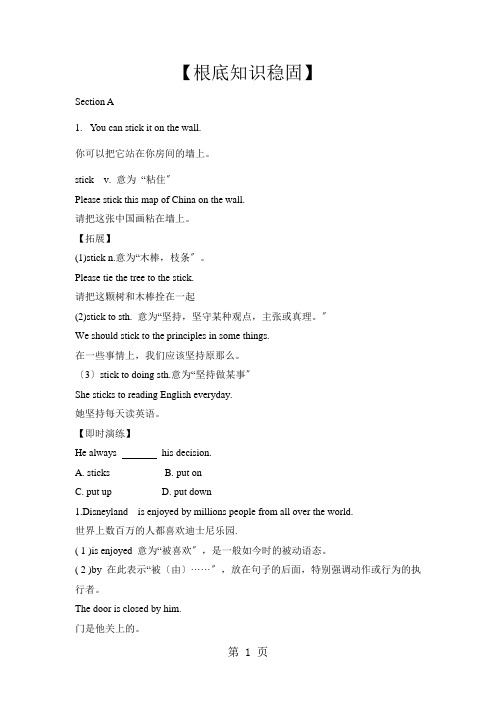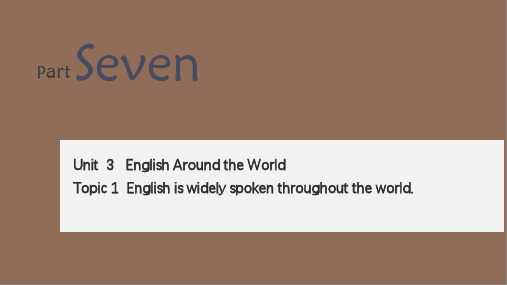Unit-Three-Topic-OneSection-A仁爱英语
- 格式:ppt
- 大小:1.06 MB
- 文档页数:22

【根底知识稳固】Section A1.You can stick it on the wall.你可以把它站在你房间的墙上。
stick v. 意为“粘住〞Please stick this map of China on the wall.请把这张中国画粘在墙上。
【拓展】(1)stick n.意为“木棒,枝条〞。
Please tie the tree to the stick.请把这颗树和木棒拴在一起(2)stick to sth. 意为“坚持,坚守某种观点,主张或真理。
〞We should stick to the principles in some things.在一些事情上,我们应该坚持原那么。
〔3〕stick to doing sth.意为“坚持做某事〞She sticks to reading English everyday.她坚持每天读英语。
【即时演练】A. sticksB. put onC. put upD. put down1.Disneyland is enjoyed by millions people from all over the world.世界上数百万的人都喜欢迪士尼乐园.( 1 )is enjoyed 意为“被喜欢〞,是一般如今时的被动语态。
( 2 )by 在此表示“被〔由〕······〞,放在句子的后面,特别强调动作或行为的执行者。
The door is closed by him.门是他关上的。
The desk is cleaned by Lily.桌子是莉莉擦的。
但有些句子不需要特别强调动作或行为的执行者。
Paper is made from wood.纸是用木材做成的。
Silk is produced in Hangzhou.丝绸是杭州消费的。
3.I hope I can go there today.我希望有朝一日能去那儿。




仁爱版九年级英语Unit 3 Topic 1测试题(含答案)一.单项选择。
(10分)( )1.—What a nice classroom!—It _____ every day.A.is cleaningB.has cleanedC.must cleanD.is cleaned( )2.I spend much money on books _____ I am not rich.A.butB.soC.even thoughD.as if( )3.China takes the leading position _____ space industry.A.inB.atC.ofD.up( )4.Teachers should _____ their students to practice _____ English as much as possible.A.encourage; speakingB.let; speakC.make; speakD.keep;speaking( )5.Maria has _____ trouble _____ math, so she often asks her math teacher for help.A.much; understandingB.no; withC.many; understandingD.not; to understand( )6.If you have a chance _____ in a university,you shouldn’t give it up.A.studyB.studyingC.to studyD.studied( )7._____ of the students in our class _____ girls.A.Three fives; isB.Three fifths; isC.Three fifth; areD.Three fifths; are( )8.I couldn’t wait _____ the box as soon as I received the gift.A.to openB.openC.openingD.for opening( )9.—What is a writing brush used for?—It’s used _____ writing and drawing.A.asB.toC.forD.by( )10._____, I have to write the words on the paper because she doesn’t know Chinese.A.SometimeB.Once in a whileC.After a whileD.For a while二.完形填空。

RenAi英语九年级上册课文翻译纯文字可编辑打印Unit1 The changing world变化中的世界1Topic 1 Our country has developed rapidly我国发展迅速Section A1a:(After a long holiday, Kangkang is happy to see his friends.)(长假过后,康康很高兴会见到他的朋友们。
)Hi, Jane! Did you have a good summer holiday?你好,简,你暑假过得愉快吗?Yes. What about you?是的,你呢?Not bad. Rita, you have just come back from your hometown. How was your trip?不错。
丽塔,你刚从家乡回来,你的旅行怎么样?Great! I went to many places near my home in India. Great changes have taken place there and my hometown has become more and more beautiful. Where have you been, Jane? 好极了!在印度,我去了我家附近的很多地方。
那里发生了很大的变化,而且我的家乡变得越来越美丽了。
简,你去哪里了?I have been to Mount Huang with my parents. It s a beautiful place. But there were so many people that I couldn t find a good place to take photos. And where have you been, Kangkang ? 我和我的父母去过黄山,那是一个美丽的地方。
但是那里人太多了,我都找不到一个好的地方拍照。
博爱版初中英语八年级上册Unit 3Our HobbiesTopic1要点单词1. n.业余喜好,喜好16. n.纸,纸张 (u) ;试卷( c)3. n.诗,韵文17. n.剪刀4. adv.可能,或许,或许18. n.v.胶水,胶;(用胶水)粘5. n.宠物;骄子;宝贝合,粘住6. v.采集,采集19. v.n.剪,切,割;伤口,张口7. v.栽种,播种; n.植物20. v.粘贴,粘住8. n.硬币21. adj. 懒散的9. v.憎恶,厌烦,愤恨22. n.章节,段落10. (口语 )( 音乐、艺术等 )大众23. n.介绍,引进的,平常的24. adj. 平时的,每天的11. n 友谊,友善,友谊(u)25. n.蛇12. adj.风趣的,可笑的26. v.供给,赐予13. adj.愚笨的,笨的27. n.猪,贪心的人14. v. 丑恶的,难看的28. adj. 肮脏的,污秽的15. n.背景词汇拓展Topic11.hobby → (pl.)______________ 业余爱2.collect→ (n.)珍藏品,收3.friend→ (n.)友谊,友善,友谊→( adj.)_______________ 友善的→( adj.)_______________ 不友善的6.introduce→ (n.)介绍,短语集锦1.在某人空余时间in one's spare/free time2.背诗recite poems3.电影迷movie fan4.去看电影go to the movie theater5.出去 go out6.做户外活动do (some)outdoor activities7.听起来不错sounds good8.需要改变一下need a change 集4.fun → ( adj.)_______________风趣的,好笑的5.cut→(过去式/过去分词)____________引进9.遛狗walk a pet dog10.集邮 collect stamps11.栽花plant flowers12.去旅游 go traveling13.learn about sth./ sb. 认识 (重申从不会到会 )learn(sth. )from sb .向某人学习(某事 ) 14.过去常常做used to do...15. 养宠物 keep pets16. 多于,超出 more than17. 以 ...开始 start with18. 把 ...沾到 ...上 stick... to...19. 删除,剪裁cut out20. 和 ...分享 ... share with21. 向某人供给某物provide sb.with sth.=provide sth for sb.在某人的生活上,在某人一世中in one ’s life/lives22. 沐浴 take/have a bath洗淋浴 take/have a shower23. 能否 whether or not24. 带某人出去漫步 take sb out for a walk句型集锦1.What do you often do?在你的业余时间你常常做什么?2. What’ s your hobby?你的业余喜好是什么?I ’ m a movie fan. I go to the movie theater a lot.I am interested in playing basketball.I love singing and playing the guitar.I enjoy dancing to music.I prefer playing soccer.I am fond of acting.I like reciting poems.3. Why not go out and? 为何不出去做一些户外活动呢?4.It must be great fun.它必定很风趣5.I collect baseball cards.But Ibasketball.我过去采集棒球卡。
【根底知识稳固】U3T3SA1 places of interest意为“名胜古迹〞。
e.g. There are many places of interest in Beijing.北京有许多名胜古迹。
2 have a long conversation/word/ talk with 与......进展长时间交谈。
3 work hard at 在……方面努力,致力于……。
e.g. They‘re working hard at oral English.他们努力练习英语口语。
hard-working意为“努力的,勤奋的〞,为复合形容词,用作定语,后跟名词。
e.g. He works hard all the time.他一直努力工作。
It’s hard work.这是艰辛的工作。
a hard-working child一个勤奋的孩子4 oral English意为“英语口语〞,等于spoken English。
5 I know oral English is very important, but I dare not speak English in public.我知道口语是很重要的,但是我不敢在公众场合说英语。
dare表示“敢于〞,与need一样,既可用作情态动词,亦可用作实义动词。
用作情态动词时,它只有一种形式,后跟动词原形,主要用于否认句和疑问句。
用作实义动词时,它有第三人称单数式dares,如今分词daring及过去式和过去分词dared,后跟带to的不定式。
e.g. She doesn’t dare to say anything.她什么都不敢说。
〔实义动词〕How dare you speak to me like that!你怎么敢这样对我说话!〔情态动词〕6 in public公开地,当众,公然地。
e.g. He doesn’t like to speak in public.他不喜欢在公共场合讲话。